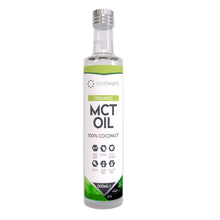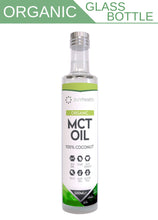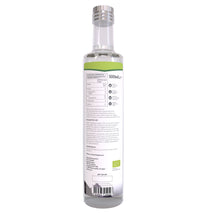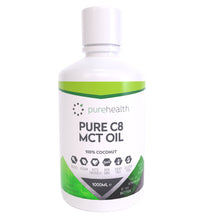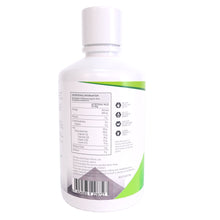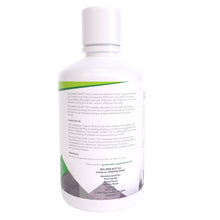Great For Your Body, Mind and Nature
Whether you’re a gym junkie, paleo partisan, kicking your keto diet up a notch or simply vegan, Pure Health MCT Oils are one of the cleanest sources of instant energy for your body and brain.
Our oils rapidly convert into ketones to provide immediate fuel for whatever you’re doing. Made from 100% sustainably-grown coconut, Pure Health oils are completely free of eco-unfriendly palm oil or GMOs, so you get unmatched quality that’s good for the planet.
Pure C8 MCT Oil is perfect if you’re looking for the perfect energy source to kickstart body and brain. Our Premium Organic MCT Oil is exactly that: completely natural, clean and untouched by palm or other eco-unfriendly ingredients.

Pure C8 MCT Oil
100% C8 Caprylic Acid
Known as C8 due to the MCTs (or medium chain triglycerides) having 8 carbon molecules, this fatty acid is converted into ketones within minutes, so it suppresses hunger and fuels your brain in a way other MCTs aren’t able to. It’s also often easier on your stomach than lower-quality MCTs, which can sometimes cause mild digestive problems like cramping.

Organic MCT Oil
60% C8 Caprylic Acid 40% C10 Capric Acid
Capric Acid has 10 carbon molecules instead of 8, so it’s a touch less powerful than C8. The two extra carbons slightly slow the conversion of the fatty acid into ketones, but you’ll still get the mental and metabolic “kick” MCTs are known for. Many use C10 to largely help support their weight loss and keep their metabolic fires well-stoked.
Ever felt drowsy a few hours after breakfast or lunch? It’s not the greatest way to tackle your day, whether you’re busy at work, sitting down to study, about to hit the gym or just doing daily errands.
MCT oils give you the focus and get-up-and-go to burn through your day. A clean, high-energy source rapidly absorbed by your body and brain, MCTs deliver a fast but sustained burst of vitality that perks you up for hours, without the “crash” that a sugar high comes with.
The secret behind MCT oils is its “convertibility” into energy — your body’s able to suck up MCTs almost instantly and put that energy straight to work.
Plus, MCT oil is completely tasteless, so it’s ideal for use in a variety of foods/drinks, making it easier to fit in your daily diet.
Every ingredient you’ll find in a bottle of Pure Health MCT Oil is sourced from 100% sustainable coconut. Not a single drop is palm oil, meaning it’s eco-friendly, orangutan-friendly, and our coconuts are completely non-GMO.
You’ll also be glad to know every bottle our oil comes in is BPA free, recyclable HDPE, so you’re doing your bit to lower the higher environmental impact of having to pad, protect and ship glass bottles.
Too much MCT oil can initially be a shock to your system, so it’s always best to start small. We recommend adding 1 teaspoon per day to any hot or cold food or drink if you’re not used to the oil. Over time, increase your dose to 1 tablespoon a day, or more if you need it.
The reason behind this slow and steady increase: too much can have a laxative effect (otherwise known as “disaster pants”). To avoid unpleasantness, start small, increase your dose slowly and reduce it if you hit problems.
Nothing.
Pure Health MCT oil doesn’t taste like anything, which is why it’s so flexible with your food.
The oil is flavourless, clear, and can tolerate temperatures up to 160C, so it’s perfect to add to food or drink — like protein shakes, smoothies, soups, salad dressing, and of course, butter coffee — without hurting the taste. You can also use it as a healthier substitute for other oils during meal preparation and cooking.
When talking fatty acids, there are three types to distinguish from: short, medium and long chain (which refers to the length of the fatty acid carbon molecule). Medium chain triglycerides, or MCTs, are fatty acids between 6 and 12 carbons long.
In this “medium length” group sit four types of fatty acids:
- Caproic acid (six carbons)
- Caprylic acid (eight carbons)
- Capric acid (10 carbons)
- Lauric acid (12 carbons) So, where do you find MCTs? They’re most often found in MCT oil, which is a concentrated source usually extracted from coconut or palm oils. You’ll also discover small amounts of MCTs in some full fat dairy products such as butter or goats cheese.
5 Ways Your Body Gets a Boost From MCT Oil
Stimulate Weight Loss, Suppress Hunger
MCTs are converted by your body into ketones¹ which do two things: 1) Keep you feeling full and suppress any appetite and 2) Act as an energy source to power you for hours.
The full feeling you get from MCT oil is due to the release of peptide YY and leptin, two hormones that promote fullness². This means you simply eat less, which is important when it comes to weight loss!
MCTs do more than just help curb your hunger. They enhance thermogenesis and fat oxidation³, which heats up your body, speeding up your metabolism and increasing fat-burning to stave off hunger pangs.


Fuel For Your Brain
Able to pass through your “blood-brain barrier”, ketones can be used by your central nervous system and brain almost immediately⁴. But the benefits go well beyond a few hours of your day. Studies⁵ have also shown MCTs can boost cognition when suffering from brain-related illnesses like Alzheimer’s Disease.
Instant Energy
The reason MCTs are so readily available as energy is because they can pass directly from the digestive system and into the bloodstream without being modified. MCTs go straight from gut to liver, where they’re processed for fuel. And, because your body so readily absorbs MCTs, you get an immediate but sustained burst of energy.


Power Your Workouts
It’s no surprise that fitness fans and athletes alike flock to MCTs. Their rapid absorption into clean, sustainable and instantly accessible energy makes it a popular pre-workout alternative to the usual carbs before hitting the gym.
MCTs have proven especially effective for high-intensity training. One study⁸ showed how supplementation increased workout duration and intensity without the usual cramps, nausea, weakness and exhaustion that usually has people hitting the showers earlier than they’d like.
Great For Your Gut
MCTs are fantastic for your workout and great for your waistline, but did you know they can also improve your gut health? MCTs have antiviral and antibacterial properties to help protect your gut, and there’s evidence⁹ they can also balance gut bacterial levels by stimulating good bacteria to grow. Plus, because they’re so readily used by your body, your digestive system gets a welcome break.

Isn’t MCT Oil the Same as Coconut Oil?
It’s easy to confuse MCT oil with coconut oil, but there’s one important difference.
MCTs in coconut oil contain large amounts of Lauric acid (C12), which, while an MCT by name, acts more like a long-chain fatty acid that’s harder for your body to digest. That means you don’t get the “instant energy” that other MCTs like C8 and C10 deliver. Lauric acid also raises your cholesterol more than other fatty acids.
Clinical results highlight the difference, with a recent study comparing MCT and coconut oils as part of a breakfast. The group taking MCTs felt fuller, ate less for lunch and reported higher energy levels than the group taking coconut oil. Oh, and they preferred the MCT oil taste too!
Customer Reviews
References
1. Schultz, L.H. et al., 1949, The Effect of the Administration of Various Fatty Acids on the Blood Ketone Levels of Ruminants https://www.journalofdairyscience.org/article/S0022-0302(49)92119-0/pdf
2. St-Onge, M. et al., 2014, Impact of medium and long chain triglycerides consumption on appetite and food intake in overweight men https://www.ncbi.nlm.nih.gov/pmc/articles/PMC4192077/
3. Nagao, K. & Yanagita, T., 2010, Medium-chain fatty acids: Functional lipids for the prevention and treatment of the metabolic syndrome https://www.sciencedirect.com/science/article/abs/pii/S104366180900276X?np=y
4. Ruskin, DN. & Masino, SA., 2012, The Nervous System and Metabolic Dysregulation: Emerging Evidence Converges on Ketogenic Diet Therapy https://www.ncbi.nlm.nih.gov/pmc/articles/PMC3312079/
5. Henderson, ST., 2009, Study of the ketogenic agent AC-1202 in mild to moderate Alzheimer's disease: a randomised, double-blind, placebo-controlled, multi centre trial. https://www.ncbi.nlm.nih.gov/pubmed/19664276
6. Chambers, L. et al., 2007, Optimising foods for satiety https://www.sciencedirect.com/science/article/pii/S0924224414002386
7. Rubio, IG. et al., 2008, Oral ingestion of a hydrolyzed gelatin meal in subjects with normal weight and in obese patients: Postprandial effect on circulating gut peptides and glucose. https://www.ncbi.nlm.nih.gov/pubmed/18319637
8. Nosaka, N. et al., 2009, Effect of ingestion of medium-chain triacylglycerols on moderate- and high-intensity exercise in recreational athletes. https://www.ncbi.nlm.nih.gov/pubmed/19436137
9. Rial, SA. et al., 2016, Gut Microbiota and Metabolic Health: The Potential Beneficial Effects of a Medium Chain Triglyceride Diet in Obese Individuals https://www.ncbi.nlm.nih.gov/pmc/articles/PMC4882694/





